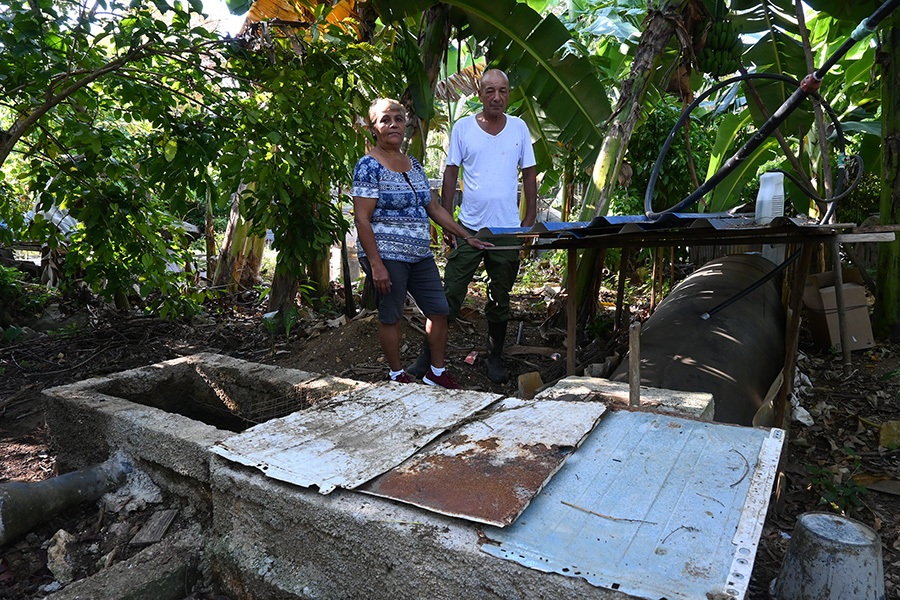VILLA CLARA, Cuba. – For more than two years, Yadira worked as a domestic in two hostels and one restaurant in Santa Clara. With the. Shut down of borders in March 2020, the owners of these establishments told her that they would no longer need her services. The restaurant informed her that they would keep only those workers that prepared food. As a single mother of a toddler daughter, Yadira tried to find work among the home-based restaurants –the paladares– in the city, but she wasn’t able to gain employment because the owners claimed they had either reduced the number of workers, or did not have the financial means to hire other workers.
In order to survive until today, this young sociology university graduate has been re-selling items -bought by others at convertible-currency stores- on a stand on Amparo Street, in the Condado neighborhood in Santa Clara. What she made on a daily basis was a small percentage of sales.
“It was the way I found to make a living; my university degree is just hanging on the wall,” she stated. “Cleaning I did without a license. In truth, my license was for “miscellaneous sales” and I turned it in years ago. That’s the reason I could not claim any [unemployment] benefit. Self-employed workers who are employed without a self-employment license are totally dependent on what business owners want to pay them, and when they no longer need you, they simply fire you without explanation.”
The effect of the pandemic on many private businesses meant the definitive firing of workers; other were furloughed until further notice. Large numbers of workers employed by hostels or estate establishments linked to the tourism sector had to find alternative employment in order to survive. According to Cubadebate, last year alone more than 250,000 licensed self-employed workers, of the existing 600,000, requested temporary cancellation of their licenses. Of these, younger Cubans account for 30% of the self-employed, women account for 35%.
Yadira’s case is not an isolated one in a province where many women are employed by private small businesses without benefit of a work contract that would make their employment legal.
“There are many, many women like me. I can assure you that in the restaurants and bars, there are more women than men working. It’s the same in the market fair, for example. The women do not own the stands, but the stand owners prefer that the sellers be women instead of men, especially young women with no children. If you ask me if that is a form of exploitation, I would say yes. Many of these young women work long hours and only get paid for what they sell in the course of the day. In other words, they do not have a steady salary, because there is no work contract.”
In Cuba, tax payments concentrate on activities of lesser complexity, and there is another more general tier where the self-employed “with greater earnings” report. During a Mesa Redonda television program, where new dispositions about self-employment in Cuba were discussed, Meisi Bolaños, minister of Finance and Prices made it clear that “the type of employment and what constitutes payable taxes, must correspond with each other.”
However, in order to avoid having to pay taxes, many small business owners subcontract personnel without signing a work contract. There are workers at restaurants, bars, beauty parlors, bakeries and manufacturing workshops who perform less-visible jobs such as cleaning, dish washing, gardening and deliveries who have no self-employment license for those tasks. All this creates the conditions for workers to earn low wages or be fired at random if the owners find workers willing to work for less money.
Generally, the type of contract that exists between employer and employee in the self-employment sector is in the category of “determined”, i.e. extending for a specific period of time. Self-employment workers face repeated violations of their labor rights without much help from the State in solving issues such as discrimination on the basis of race or sex. The state also does not address issues of beauty stereotypes for workers who deal directly with the public. Several publications on social media, as well as ads on the doors of establishments looking to hire help, confirm that cafeteria and restaurant owners look for young women with “the appropriate look” for dealing with clients.
During interviews conducted for this research, we met “Adriana”, who requested that we use this fake name during the interview: “When I graduated from high school, I started working at a snack stand, but one day the owner started bringing in bottled beer and Decano rum. One is not supposed to sell alcoholic beverages, but since the stand was in an isolated neighborhood, no inspector noticed.”
The stand where Adriana worked slowly became a hub for drunkards, all men. “The owner had me working long hours, from early in the afternoon until late at night when the men would start leaving. That was unbearable, they would harass me, calling out obscenities at me. At one point, the boss told me that if I wore shorter skirts that were more provocative, and I showed up well-groomed and made-up, he would pay me more for the extra hours.”
Thirty-year-old Indira also endured labor-rights violations in the self-employment sector. She was working as a waitress at a bar in the city, when one day the owner “transferred” her to the kitchen to fry croquettes and prepare finger foods. “I think it was because I had gained some weight. One day he showed up with a younger woman with a curvy body. He said I could no longer work serving tables, and that, if I wanted to keep working at the bar, it would have to be as a cook. I had to do it, because I needed the money. He would pay me according to what was consumed each evening. I had to work long hours on my feet, usually from 6 pm until one or two o’clock in the morning.”
Although Indira felt discriminated against by her employer, she has no intention of going back to working for the State. “Truly, I don’t know if that constitutes exploitation or not, but before, when I worked as a receptionist, things happened that were not in my job description, and I earned much less. Women who work as self-employed will not leave their jobs, even if they feel exploited, because they fear there are many other women who would happily take their place. Steady employment is very difficult to find.”

In 2019, the Observatory on Economic Rights (Observatorio de Derechos Económicos) published an article that affirmed that exploitation of the workforce is not recognized as such in the Penal Code, although its occurrence is a constant phenomenon in today’s Cuba. It was also acknowledged that, although questions are being raised on the matter, they pertain only to labor relations in the State sector. The article makes reference to Law 116 of the Work Code, which establishes that the relationship between employer and employee in the non-State sector is formalized by a work contract, regardless of how often this requirement is not enforced or the lack of legal consequences for those employers.

As to maternity benefits, the women who work in the State sector have more protection than those in the private sector. Law Decree 278 from 2010, which deals with social security issues for self-employed workers, establishes that “the pregnant female worker has the right to paid maternity leave starting on the 34th week of pregnancy.” However, many self-employed women choose to work until late in their pregnancy as long as the work is not physically strenuous.
Law Decree 240 from 2017, a more concise document than the one that protects women in the State sector, states that self-employed mothers will be exonerated from contributing to social security during their pregnancy. However, the majority of self-employed women lose their jobs once maternity leave kicks in even if they are covered by this special social security regimen. Also, until now, non-State workers must contribute to social security at least for 12 months before going on maternity leave, contrary to State workers who must demonstrate only 75 working days in the previous year.

Lismari is another woman from Santa Clara who has been the victim of her employer’s arbitrary decisions. “I worked as a sales clerk in an establishment whose name I should not mention,” she states.
“When I got pregnant, both [man and woman] owners told me that I could continue working until my health allowed it, but I came close to a miscarriage and I stopped working. When I tried to return to work, another woman had been hired. I didn’t want to argue with these people because they have influence here, so I resigned myself. Right now, I have a similar job, but I don’t have any job security. When m son gets sick, for example, I pay a young woman to take my place at work, that way I can keep the job.”

To date, everything seems to indicate that women who work in the State sector enjoy more benefits than those in self-employment, among them the ability to incorporate themselves to their employment once maternity leave has ended. Last October 13, the Council of State approved a new law decree that establishes new maternity regulations. It’s hoped that with the new measures, the rights of women in both sectors will become more equal.
However, self-employed women like Lismari affirm that new laws will ensure nothing if those who are supposed to enforce them “look the other way.” “There will be cases where certain business owners will be fined, but there are others who will continue to trample on and exploit their female employees because they’ll have money or influence to bribe the inspectors. There will also be women like me who will be afraid of reporting the owner for fear of not being able to find another job in the self-employment sector. In this city, most people who are self-employed know each other, and you know what they say: small town, big Hell.”
Note: In writing this report, we have respected the decision of the women interviewed to not have their last names included, to avoid any direct reference to their employers or to their present jobs.
ARTÍCULO DE OPINIÓN
Las opiniones expresadas en este artículo son de exclusiva responsabilidad de quien las emite y no necesariamente representan la opinión de CubaNet.
Recibe la información de CubaNet en tu celular a través de WhatsApp. Envíanos un mensaje con la palabra “CUBA” al teléfono +1 (786) 316-2072, también puedes suscribirte a nuestro boletín electrónico dando click aquí.







